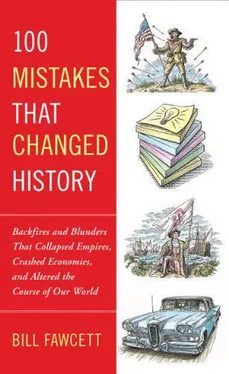In the months leading up to the First Gulf War, miscalculation was the name of the game. Western intelligence agencies grievously miscalculated the probability of Iraq invading Kuwait; Hussein grievously miscalculated the probability of Western reprisal. Hussein’s murderous tendencies were well-known in his treatment of Kurds in northern Iraq. Tales of horrendous actions by the Iraq army in Kuwait unsettled many Western politicians. Months of diplomatic wrangling won small concessions from Iraq; in December 1990, Hussein released hostages whom he had been using as insurance against an invasion. Nonetheless, Iraq was resolute in its opposition to what Hussein declared as “flagrant Western imperialism.” This period was later to be described by Bush as his attempt at “giving peace a chance.”
A UN resolution, championed by Margaret Thatcher, issued an ultimatum to Iraq—withdraw by January 15, 1991, or “all necessary means” would be justified against Iraq. Buoyed by oft-embellished descriptions of atrocities committed in Kuwait and the opportunity to assert American dominance in a new era of unipolarity, President Bush narrowly earned authority from Congress to use military force against Iraq shortly before the deadline. On January 17, 1991, Operation Desert Shield, the five-month military strategy of defending Saudi Arabia against aggression by Iraq, became Operation Desert Storm.
Operation Desert Storm was a remarkably one-sided affair. The U.S. military deployed 1,700 planes in the first assault, losing only one. The air attack (including planes from the United States, Britain, France, Italy, Kuwait, and Saudi Arabia) focused on destroying weapons facilities (such as nuclear, biological, and chemical), communication centers, air bases, and bridges. Hussein’s palace was bombed, though he had fled to a residential area. Vietnam-era strategies of ignoring civilian casualties had been discarded as the recipe for a public relations disaster; consequently, with few exceptions, the coalition avoided striking areas where civilians were at risk. Iraq lashed out against neighbors Israel and Saudi Arabia with Scud missiles, though most were shot down by U.S. forces. Israel’s desire to retaliate was tempered by the United States, which feared Israeli participation in the war would alienate predominantly Muslim countries of the coalition.
In mid-February 1991, the ground assault began after Iraq ignored another ultimatum to withdraw. Iraq’s army continued to set oil facilities to fire in Kuwait and did not withdraw. General Colin Powell convinced General Schwarzkopf to begin an assault into Iraq, which began in full force on February 24. Iraq’s troops surrendered in droves and various tank skirmishes had lopsided results. Baghdad radio announced on the twenty-sixth that Iraq would comply with UN demands. The coalition had suffered a mere 379 deaths, half of them due to friendly fire or accidents. These numbers were far lower than preinvasion predictions; the military effort was regarded as a great success.
It was at this critical juncture that President Bush committed a grave error. While encouraging popular revolt via leaflets distributed by planes across Iraq, he committed no military effort to guarantee the success of such a revolt. Demands of Iraq after the war included withdrawal out of Kuwait and release of hostages, but there was no insistence that Hussein stand trial for his crimes. Bush presumably believed the political defeat Hussein suffered would make his downfall inevitable; however, Hussein’s firm control of the military prevented an internal coup. The Intifada, a popular uprising against Hussein in the wake of the war, was brutally suppressed. U.S. military forces observed the slaughter without providing aid. Many members of the Intifada have since stated that they did not require American troops to fight but merely desired military supplies to help finance their efforts; reports have since suggested that the U.S. military refused such assistance and, in some instances, directly frustrated rebel efforts. America had called for a rebellion and seemingly changed its mind about such a rebellion’s desirability. Tens of thousands of Shiites were slain in the conflict, often via chemical weapons that the United States had specifically condemned. However, the media were largely unaware of such actions as Bush exultantly declared to Congress and the public that the war was over. Fear for American soldiers and coverage of the “Highway of Death” (U.S. bombing of a retreating Iraqi military convoy that was widely deemed unnecessary) made continued U.S. involvement in the Gulf unpalatable to many.
Margaret Thatcher, no longer prime minister in Britain, was appalled at the coalition’s decision to leave Hussein in power. She declared, “Half measures never work, you’ve… got to do the job properly and show the world you’re serious so they better not let it happen again.” She was right—in the decade that followed the war, atrocities continued to be committed by Hussein’s regime. It was not long before Hussein was again shunning the West, hijacking domestic attempts at democracy, and ignoring international demands to investigate Iraq’s potential weapons of mass destruction (WMDs) facilities.
After 100 almost casualty-free hours the coalition troops stopped. This left Hussein in control of the core of his country. Why the attack was stopped and he was left in power has been explained many ways. The official explanation was that the UN had said to free Kuwait, and the troops stopped once that was ensured. However, this does not explain occupying half of Iraq and enforcing a no-fly zone over those areas even after the UN forces pulled out. The pundits said that it was because there would be a power vacuum left in Baghdad, which could be bad. This power vacuum was apparently a worse alternative than keeping a psychopathic dictator in power—a man who gladly dropped nerve poison on his own people a few years later. Or maybe the United States just didn’t want to upset Iraq’s neighbors by completing the conquest. The improvement in the relations between the United States with Iran and Syria had not really occurred. Or maybe George H. W. Bush did not want the problems of occupying the country once we had it. Perhaps that reasoning makes the most sense, though he might have mentioned this to his son and saved a lot of trouble later.
History since has shown that whatever the potential problems, the job should have been finished. Why? Because the United States did it all over again twelve years later. Had the UN and America taken a more courageous stand, tens of thousands of Iraqis might not have had to die in another war and thousands of Americans might not have died in both the second invasion and the subsequent occupation. The problem of Iraq could have ended in 1991. But it did not, and the reverberations of that mistake have negatively affected the U.S. economy, foreign policy, reputation, and social order ever since.
98. BELIEVING THE WRONG PEOPLE
The Hunt for Weapons of Mass Destruction
2002
In 2002, Vice President Dick Cheney charged that, “Simply stated, there is no doubt that Saddam Hussein now has weapons of mass destruction [WMDs].” It was not long after the United States invaded Iraq in 2003 that it became clear that the only thing that could not be doubted was that Cheney had been dead wrong. President George W. Bush later called the intelligence breakdown the biggest regret of his tenure. The invasion of Iraq became a fiasco, a reflection of poor military planning and careless intelligence gathering. The Bush administration erred in such an egregious way that the repercussions are still being felt years after the initial 2003 invasion.
The history of Saddam Hussein and weapons of mass destruction seemed, on the surface, to support the administration’s charge that Iraq was pursuing such weapons. Hussein had used deadly chemical weapons against the Kurds in northern Iraq, against Iran during the Iraq-Iran War, and to suppress revolts in the immediate aftermath of the First Gulf War; moreover, attempts at securing nuclear triggers and establishing purportedly civilian nuclear facilities in the 1980s were thwarted by British customs officials and Israeli missiles, respectively. Hussein’s rhetoric leading up to the First Gulf War certainly seemed to point to the fact that he regarded possession of WMDs as a crucial measure for preserving Iraq’s security against Israel and other aggressors.
Читать дальше












